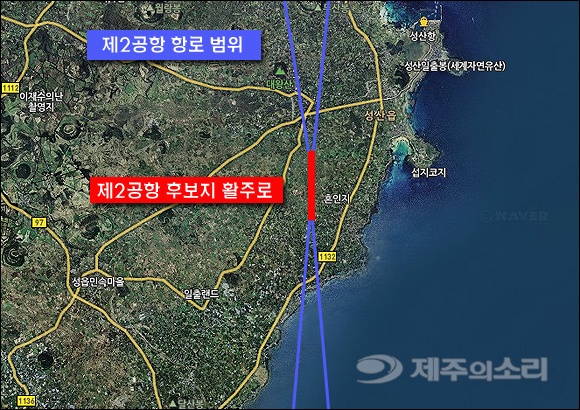| |
 |
|
| ▲ Jeju's second airport at Sinsan-ri, Seongsan-eup. Image courtesy Jeju Sori |
Jeju’s second airport will be built by 2025 at Sinsan-ri, Seongsan-eup, the Land and Transport Ministry announced on Nov 10.
The 13.99km2 Sinsan-ri site in Jeju’s southeast beat off competition from Sindo-ri, Daejeong-eup, and two other potential sites.
The current airport on Jeju’s north coast processes 23.2 million passengers, making it the second busiest in the country after Incheon in Seoul.
With Gimpo-Jeju already the busiest air route in the world, the airport is slated to reach saturation point by 2018 with the domestic terminal to reach absolute capacity by next year.
Jeju attracted 12 million tourists in 2014, 3.3 million of whom were international visitors.
The province states that airport expansion is essential if the province is to hit its target of 20 million tourists by 2020.
Beginning in November last year, the Korea Aerospace University Consortium began an 800-million-won airport infrastructure expansion feasibility study.
The team looked at three options: 1) Expanding the existing airport; 2) Constructing a new airport and closing the existing airport; 3) Constructing a new airport and maintaining the existing airport.
The first option would have necessitated large-scale sea reclamation (average height of 50m) at a cost of 9.4 trillion won and with damage to the marine environment.
Jeju residents opposed the second option due to plans to close the existing airport, and there were environmental concerns around the construction of a large-scale new airport.
The construction of a new 4.1 trillion won single-runway airport in Seongsan-eup is not only cheaper but is thought to involve less environmental damage.
The research team thus settled on the third option and chose Sinsan-ri as:
- Flights will not cause any disruption to existing flight paths;
- The new flight paths will disturb few residential districts;
- There is less concern over environmental damage.
The research team will now progress with more detailed plans to ensure the new airport is fully operational by 2025.
See original story at Jeju Sori. |




















